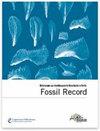下载PDF
{"title":"宁夏下河岩地区早宾夕法尼亚世齿翅目:新材料、新分类群和新观点","authors":"Yongjun Li, Olivier Béthoux, Hong Pang, Dong Ren","doi":"10.1002/mmng.201300006","DOIUrl":null,"url":null,"abstract":"<p>Data on Odonatoptera species from the Xiaheyan locality (Ningxia, China; Early Pennsylvanian) described so far are complemented based on abundant new material. Several taxonomic and nomenclatural adjustments are proposed. The species <i>Tupus readi</i> Carpenter, 1933 is transferred to the genus <i>Shenzhousia</i> Zhang & Hong, 2006 in Zhang et al. (2006), and therefore should be referred to as <i>Shenzhousia readi</i> (Carpenter, 1933) n. comb. The monotypic genus <i>Sinomeganeura</i> Ren et al., 2008 is synonymized with <i>Oligotypus</i> Carpenter, 1931. As a consequence the type species of the former must be referred to as <i>Oligotypus huangheensis</i> (Ren et al., 2008) n. comb. The monotypic genus <i>Paragilsonia</i> Zhang, Hong & Su, 2012 in Su et al. (2012) is synonymized with <i>Tupus</i> Sellards, 1906. As a consequence the type-species of the former is to be referred to as <i>Tupus orientalis</i> (Zhang, Hong & Su, 2012 in Su et al. (2012)) n. comb. The monotypic genus <i>Sinierasiptera</i> Zhang, Hong & Su, 2012 in Su et al. (2012) is synonymized with <i>Erasipterella</i> Brauckmann, 1983. As a consequence the type-species of the former is to be referred to as <i>Erasipterella jini</i> (Zhang, Hong & Su, 2012 in Su et al. (2012)) n. comb. In addition <i>Aseripterella sinensis</i> n. gen. et sp. and <i>Sylphalula laliquei</i> n. gen. et sp. are described. The ‘strong oblique distal' cross-vein, located in the area between RA and RP is found to occur more extensively than previously expected. It is believed to be a structure distinct from the subnodal cross-vein, and therefore deserves to be referred to by a distinct name (viz. ‘postsubnodal cross-vein'). Odonatoptera from the Xiaheyan locality cover a broad range of sizes. Factors that could have promoted the evolution of large-sized Odonatoptera are briefly reviewed. The permissive conditions prevailing during the Pennsylvanian, and the existence of an elaborated food web, are emphasized as putative positive factors. The new taxonomic treatment suggests that genera documented in the Lower Permian, such as <i>Shenzhousia</i> and <i>Oligotypus</i>, stem from the early Pennsylvanian, and implies a high resilience of these taxa when facing the Pennsylvanian–Permian environmental perturbations. (© 2013 WILEY-VCH Verlag GmbH & Co. KGaA, Weinheim)</p>","PeriodicalId":55147,"journal":{"name":"Fossil Record","volume":"16 1","pages":"117-139"},"PeriodicalIF":1.4000,"publicationDate":"2013-02-21","publicationTypes":"Journal Article","fieldsOfStudy":null,"isOpenAccess":false,"openAccessPdf":"https://sci-hub-pdf.com/10.1002/mmng.201300006","citationCount":"18","resultStr":"{\"title\":\"Early Pennsylvanian Odonatoptera from the Xiaheyan locality (Ningxia, China): new material, taxa, and perspectives\",\"authors\":\"Yongjun Li, Olivier Béthoux, Hong Pang, Dong Ren\",\"doi\":\"10.1002/mmng.201300006\",\"DOIUrl\":null,\"url\":null,\"abstract\":\"<p>Data on Odonatoptera species from the Xiaheyan locality (Ningxia, China; Early Pennsylvanian) described so far are complemented based on abundant new material. Several taxonomic and nomenclatural adjustments are proposed. The species <i>Tupus readi</i> Carpenter, 1933 is transferred to the genus <i>Shenzhousia</i> Zhang & Hong, 2006 in Zhang et al. (2006), and therefore should be referred to as <i>Shenzhousia readi</i> (Carpenter, 1933) n. comb. The monotypic genus <i>Sinomeganeura</i> Ren et al., 2008 is synonymized with <i>Oligotypus</i> Carpenter, 1931. As a consequence the type species of the former must be referred to as <i>Oligotypus huangheensis</i> (Ren et al., 2008) n. comb. The monotypic genus <i>Paragilsonia</i> Zhang, Hong & Su, 2012 in Su et al. (2012) is synonymized with <i>Tupus</i> Sellards, 1906. As a consequence the type-species of the former is to be referred to as <i>Tupus orientalis</i> (Zhang, Hong & Su, 2012 in Su et al. (2012)) n. comb. The monotypic genus <i>Sinierasiptera</i> Zhang, Hong & Su, 2012 in Su et al. (2012) is synonymized with <i>Erasipterella</i> Brauckmann, 1983. As a consequence the type-species of the former is to be referred to as <i>Erasipterella jini</i> (Zhang, Hong & Su, 2012 in Su et al. (2012)) n. comb. In addition <i>Aseripterella sinensis</i> n. gen. et sp. and <i>Sylphalula laliquei</i> n. gen. et sp. are described. The ‘strong oblique distal' cross-vein, located in the area between RA and RP is found to occur more extensively than previously expected. It is believed to be a structure distinct from the subnodal cross-vein, and therefore deserves to be referred to by a distinct name (viz. ‘postsubnodal cross-vein'). Odonatoptera from the Xiaheyan locality cover a broad range of sizes. Factors that could have promoted the evolution of large-sized Odonatoptera are briefly reviewed. The permissive conditions prevailing during the Pennsylvanian, and the existence of an elaborated food web, are emphasized as putative positive factors. The new taxonomic treatment suggests that genera documented in the Lower Permian, such as <i>Shenzhousia</i> and <i>Oligotypus</i>, stem from the early Pennsylvanian, and implies a high resilience of these taxa when facing the Pennsylvanian–Permian environmental perturbations. (© 2013 WILEY-VCH Verlag GmbH & Co. KGaA, Weinheim)</p>\",\"PeriodicalId\":55147,\"journal\":{\"name\":\"Fossil Record\",\"volume\":\"16 1\",\"pages\":\"117-139\"},\"PeriodicalIF\":1.4000,\"publicationDate\":\"2013-02-21\",\"publicationTypes\":\"Journal Article\",\"fieldsOfStudy\":null,\"isOpenAccess\":false,\"openAccessPdf\":\"https://sci-hub-pdf.com/10.1002/mmng.201300006\",\"citationCount\":\"18\",\"resultStr\":null,\"platform\":\"Semanticscholar\",\"paperid\":null,\"PeriodicalName\":\"Fossil Record\",\"FirstCategoryId\":\"89\",\"ListUrlMain\":\"https://onlinelibrary.wiley.com/doi/10.1002/mmng.201300006\",\"RegionNum\":4,\"RegionCategory\":\"地球科学\",\"ArticlePicture\":[],\"TitleCN\":null,\"AbstractTextCN\":null,\"PMCID\":null,\"EPubDate\":\"\",\"PubModel\":\"\",\"JCR\":\"Q3\",\"JCRName\":\"Earth and Planetary Sciences\",\"Score\":null,\"Total\":0}","platform":"Semanticscholar","paperid":null,"PeriodicalName":"Fossil Record","FirstCategoryId":"89","ListUrlMain":"https://onlinelibrary.wiley.com/doi/10.1002/mmng.201300006","RegionNum":4,"RegionCategory":"地球科学","ArticlePicture":[],"TitleCN":null,"AbstractTextCN":null,"PMCID":null,"EPubDate":"","PubModel":"","JCR":"Q3","JCRName":"Earth and Planetary Sciences","Score":null,"Total":0}
引用次数: 18
引用
批量引用


